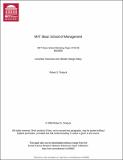Uncertain Outcomes and Climate Change Policy
Author(s)
Pindyck, Robert S.
DownloadSSRN-id1448683.pdf (303.6Kb)
Metadata
Show full item recordAbstract
Focusing on tail effects, I incorporate distributions for temperature change and its economic impact in an analysis of climate change policy. I estimate the fraction of consumption w*(τ) that society would be willing to sacrifice to ensure that any increase in temperature at a future point is limited to τ. Using information on the distributions for temperature change and economic impact from studies assembled by the IPCC and from “integrated assessment models” (IAMs), I fit displaced gamma distributions for these variables. Unlike existing IAMs, I model economic impact as a relationship between temperature change and the growth rate of GDP as opposed to its level, so that warming has a permanent impact on future GDP. The fitted distributions for temperature change and economic impact generally yield values of w*(τ) below 2%, even for small values of τ, unless one assumes extreme parameter values and/or substantial shifts in the temperature distribution. These results are consistent with moderate abatement policies.
Date issued
2009-08Publisher
Cambridge, MA; Alfred P. Sloan School of Management, Massachusetts Institute of Technology
Series/Report no.
MIT Sloan School of Management Working Paper;4742-09
Keywords
catastrophic outcomes, global warming, climate change, Environmental policy